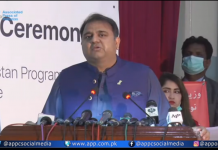Published on: August 18, 2025 12:12 PM

After 28 long years, the first Sindhi feature film Indus Echoes was screened at the National Academy of Performing Arts (NAPA) in Karachi, highlighting stories connected to the River Indus. The screening was organized under the Imagine Life project in collaboration with the Climate Action Centre (CAC), marking an important cultural revival for Sindhi cinema in Pakistan.
The film portrays the lives of farmers, poets, fishermen, and lovers while exploring their deep connection with the River Indus. Director and writer Rahul Ijaz revealed that the entire story was made in Sindhi, later supported with English subtitles to reach a wider audience. He emphasized that the film focuses on the complex relationship between humans and the river that has shaped their history and culture.
Following the screening, a panel discussion featured journalist and activist Afaq Bhatti, who said that dams and barrages built on the Indus were deep wounds for the river. He added that the film was shot near Kotri Barrage, further stressing that Sindh’s civilization was not limited to the Indus but was linked to the entire river system of the region.
Meanwhile, CAC Director Yasir Darya explained that after watching the trailer, he immediately realized the importance of the project, which led to its selection for screening. He confirmed that Indus Echoes will be officially released nationwide on September 12, aiming to reach a broader audience and spark critical discussions about climate and culture.
The event began with presentations by Dr. Saadia Abbas from Rutgers University and writer Neelofar Farrukh. Dr. Abbas emphasized that climate change requires collective involvement, blaming both the colonial era and later industrial development for damaging ecosystems and communities.
Neelofar Farrukh further stressed that creative imagination is the only solution to such challenges and warned that people are increasingly ignoring the messages of nature. Another panel discussion titled Connecting Transformative Energies also explored how films, imagination, and future planning can inspire meaningful change in society.










